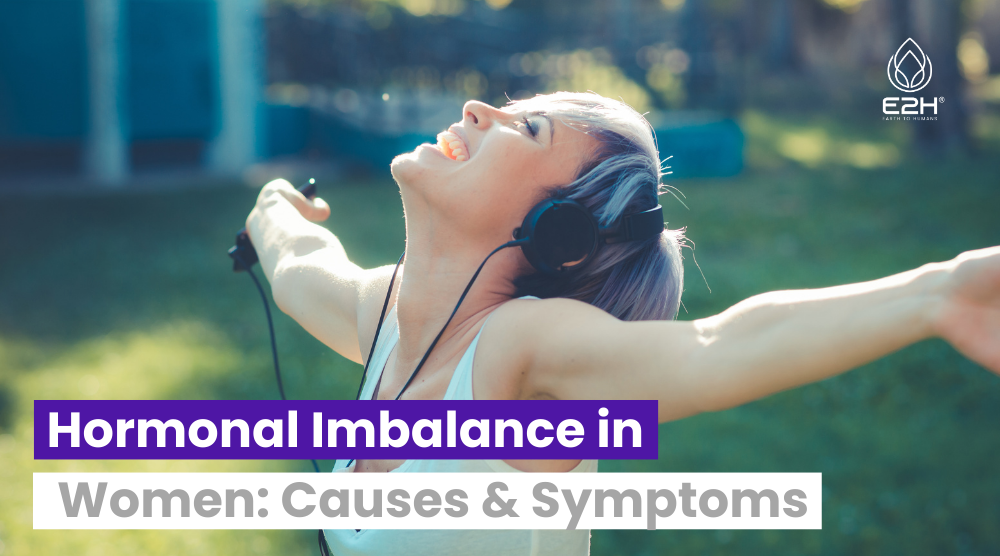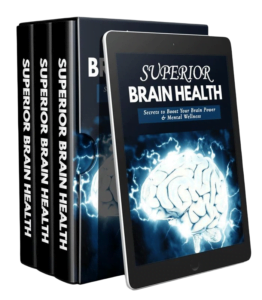Hormonal imbalances in women can result from factors like polycystic ovary syndrome (PCOS), menopause, thyroid disorders, stress, and certain medications. Symptoms may include irregular periods, weight gain, mood swings, fatigue, hair loss, acne, and changes in libido. Consultation with a healthcare provider is recommended for diagnosis and treatment.
What does Hormonal imbalance Mean?
Hormones are chemical messengers produced by special glands in your body. These glands are part of the endocrine system. After receiving a specific signal, endocrine glands release hormones into the bloodstream. Hormones reach the target tissues making their way through the blood. There, they stimulate the tissues to perform the required task at hand.

Metabolism, reproduction, stress management, blood sugar management, and several other functions are performed by hormones. An increase or decrease in hormonal levels can deteriorate the functioning of your body. Hormones are just like the ingredients in a recipe. A slight error in putting an ingredient in an adequate amount leads to spoiling the recipe. Similarly, severe effects throughout your whole body can appear in case of hormonal imbalance.
What Causes Hormone imbalance in women?
Abnormalities in hormone levels can be due to several reasons. Some causes are known to influence the functioning of different hormones. In contrast, some causes only damage a specific gland, for example, the thyroid gland.
It can also be associated with endocrine diseases such as diabetes mellitus, thyroid abnormalities, Cushing disease, Addison’s disease, and congenital hormonal deficits. However, hormonal imbalance in women is primarily because of HRT, oral contraceptives, obesity, and stress that influences the endocrine system. The complete detail of these factors is described in detail here.
Hormone Replacement Therapy
Over the last two years, there has been a rise in the use of hormones in women to manage menopausal symptoms. But with their increasing use, a significant increase in blood clotting defects, stroke, and heart disease cases has occurred. Most notably, the lethal effect of HRT is the increased risk of breast cancer. All these effects are because of the hormonal imbalance of the natural hormones in the body.
According to a clinical study, a woman who takes HRT after menopause is at 26% more risk of developing breast cancer in her 50s and 60s [1]. Based on these findings, experts say that HRT’s benefits outweigh its adverse effects. More specifically, estrogen levels affect breast tissue which becomes cancerous. As a result, scientists are trying to manufacture a hormone that mimics natural substances without raising cancer risk. Until then, avoiding this therapy can save you from having damaging effects on your body.
Birth Control Pills
Another way to distort natural hormone levels is using a birth control pill. These pills contain synthetic estrogen and progesterone that influence the hormone release from the body, creating a false perception of pregnancy. Therefore, the body stops producing reproductive hormones, leading to hormonal imbalance.
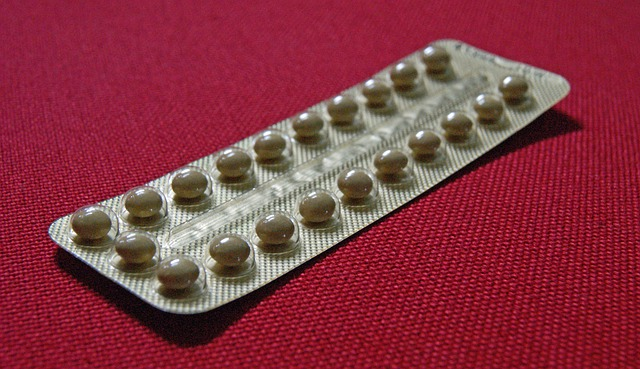
The use of these pills is increasing among teenage girls. Unfortunately, the most lethal effect is an increased risk of breast cancer. According to medical literature, girls who use oral contraceptives from 13 to 21 are at a 600% greater risk of developing breast cancer late in life [2]. Girls who use birth control pills early in life expose their underdeveloped breast tissue to severe abnormalities in hormone levels. The hormonal imbalance associated with using birth control pills is also linked to fertility issues in young girls.
Obesity and Insulin Resistance
One of the most common reasons for hormonal imbalance in women is unexplained weight gain or obesity more fats in the blood damage hormonal functions. However, insulin is the one that needs our attention here.
Obesity causes insulin resistance. It is a process in which the body produces enough insulin. However, it is unable to perform its function on the tissues. There are different possible explanations for this outcome. First, fat cells act as a physical barrier preventing the attachment of insulin to the target cells. In this way, the chemical message that insulin is carrying is not transmitted to the tissues.
Second, obesity is associated with inflammatory changes in the body. These changes can destroy the tissues’ insulin receptors, leading to a poor cellular response to this hormone. Regardless of the mechanisms, weight gain causes insulin resistance, significantly increasing your risk of diabetes mellitus [3].
The tale of the lethal effects of obesity is not complete yet. It is also known to cause another hormonal disease known as polycystic ovary syndrome (PCOS). According to a clinical study, most patients with PCOS are either overweight or obese, proving a solid association between these two certain medical conditions [4].
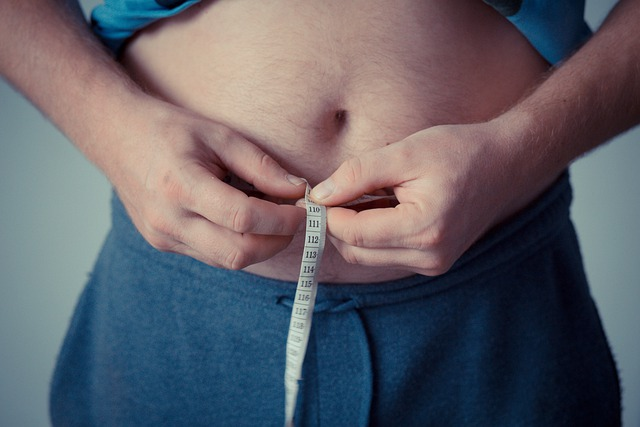
Stress-Related Adrenal Hormone levels
Stress is a silent killer that slowly damages your body. It is more common during mid-life when women used to take much more stress than other age groups. The body responds to increasing stress by producing large amounts of cortisol. It increases blood pressure and accelerates energy extraction from the body’s food reserves to deal with stressful situations.
However, too much stress can damage your body and cause hormonal imbalances. For example, stress over long durations increases insulin resistance through a mechanism similar to obesity [5]. Moreover, when there is an increased demand for cortisol, the body compensates by decreasing the production of others, such as progesterone. The results are an abnormal menstrual cycle and irregular periods [6]. This is why women often experience irregular periods in their stressful day-to-day life.
What are the Symptoms of hormonal imbalance?
It can be because of a hormonal imbalance if you are often irritable or not your best. Hormonal levels also occur naturally during different stages of life. However, hormonal changes beyond the normal ranges lead to some symptoms. You should know these symptoms to be timely handle them.
Unexplained Weight Gain or Weight Loss
One of the menopause symptoms is increased appetite. It can be because of several reasons. One of the possible explanations is the decrease in the levels of estrogen in the body. You can confirm low levels of estrogens by symptoms such as hot flashes. Low estrogen levels in the blood are associated with imbalances in the leptin hormone [7]. Leptin normally suppresses hunger and appetite. Therefore, leptin imbalance leads to increased appetite. Increased appetite pokes you to eat more, leading to unnecessary weight gain.
Not all hormonal changes are associated with an increase in body weight. Excess of others, such as thyroid hormone, can cause women to lose 10 pounds within a week. Thyroxine increases metabolism and helps to burn calories. However, when produced in excess, the body burns way more calories than it consumes. Therefore, you would lose weight in such a condition.
Acne, Dry Skin, and Hair Loss
Have you ever noticed an acne breakout during your period? That is normal, as it corresponds to the natural hormonal changes in the body. But long-term or chronic acne can be because by hormonal changes. The hormone responsible for this effect is an androgen (a male hormone produced in negligible amounts in females from the endocrine glands). Under certain conditions, your adrenals will start producing more than normal androgens that promote the growth of oil glands on your skin. As a result, oily skin promotes the growth of bacteria and leads to chronic acne.
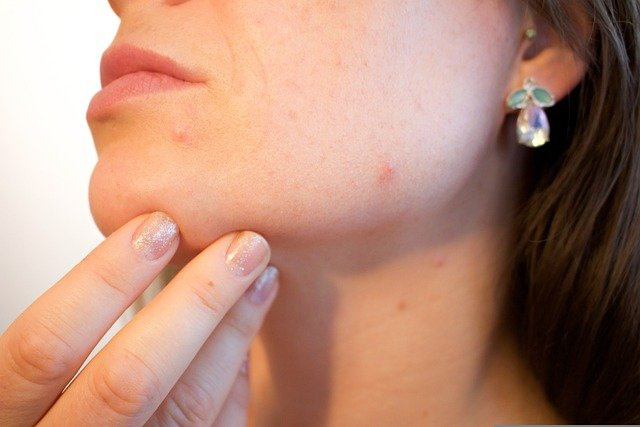
You have learned that androgens make skin oily, but hormonal changes make skin dry and scaly. It mainly occurs after menopause. In this condition, skin can no longer hold the moisture it used to. The risks of dry, scaly skin are much more significant in conditions with more than average thyroid hormones. When estrogen decreases, male hormones start increasing in the female body. They cause the thinning of hair, leading to severe hair loss. It mainly occurs during pregnancy, after menopause, or when you start taking birth control pills. Moreover, hair loss can also occur in an irregular menstrual cycle.
Sleep Problems and Night Sweats
Progesterone naturally helps a woman’s body to fall asleep. Its deficiency during irregular periods causes sleep problems. Hormones, through their influence on sleep patterns, are known to affect your mood and energy levels [8]. Moreover, estrogen deficiency can lead to hot flashes, which make sleep difficult. Another sleep-related issue due to estrogen deficiency is increased night sweats [9].
Digestive System Issues
Your digestive system has receptors for estrogen and progesterone. When there is either or decrease in their levels, you will experience bloating, poor digestion, and other digestion-related issues. It mainly occurs during certain stages of the menstrual cycle. However, hormonal imbalances such as thyroid dysfunction can be responsible for digestive issues.
Memory and Attention Problems
Estrogen and progesterone changes also make your head foggy and cause some attention and memory problems. Experts do not know the exact mechanism responsible for this process. However, these occur most commonly during and after menopause. Some other hormonal dysfunction can be responsible for this symptom.
Fatigue and Depression
Chronic fatigue can be a symptom of thyroid hormone deficiency. Moreover, changes in progesterone levels can also make you sleepy. You will feel tired throughout the day due to defects in this hormone. Lack of sleep can trigger fatigue and mood swings. Women who experience these symptoms of hormonal imbalance also remain depressed about their deteriorating health.
Defects of Reproductive Functions
Last but not least, women with hormonal abnormalities also experience poor fertility issues. One common finding is vaginal dryness and irritation. It is because of the poor maintenance of vaginal discharge and vaginal dryness. Loss of libido can also occur in women with hormonal abnormalities.
How Do You Know If You Have Hormonal Imbalance?
There is no single test that can tell you if you have a hormonal imbalance or not. You must visit a health professional to develop a confirmed diagnosis of your condition. He will take your complete medical history and perform a physical examination. After which, he will advise you on some tests.

At-Home Tests
If you notice any of the above-mentioned symptoms of hormonal imbalance, you can use a home testing kit. These kits are available for a variety of hormonal abnormalities.
For example, these kits can help you know the follicle-stimulating hormone or luteinizing hormone levels in urine affected by menopause or birth control pills. Other thyroid hormones, cortisol, and sex hormone kits are also in medical stores.
Laboratory Tests
The chances of errors are more significant in at-home tests. Therefore, it would be best to evaluate your hormonal levels using laboratory tests. Blood tests, pelvic examinations, ultrasounds, and thyroid scans can be helpful in these conditions.
How to Get Rid of Hormonal imbalance?
In hormonal abnormalities, your body either decreases or increases the levels of some hormones. Therefore, the treatment will depend on your specific condition. Such as thyroid hormone deficiency can be corrected by taking this hormone in tablets. Moreover, acne can be rectified by anti-androgenic medicines. However, these medicines are beyond the understanding of an ordinary man. Therefore, it’s better to consult a doctor.
Natural Remedies for Hormone Imbalances in Women
There is evidence in the literature that poor lifestyle habits and a Western diet make you more susceptible to hormone imbalances. In contrast, a nutritious diet and healthy lifestyle changes can make your body function at its best. Here you will learn some natural remedies to correct hormone imbalances.
Indulge in Regular Exercise
Exercise, in addition to keeping your body fit and active, also strongly influences women’s health. It increases blood flow to the tissues enhancing the delivery of hormones. Moreover, exercise is also known to enhance the sensitivity of tissues toward hormones [10]. Without exercise, you will gain weight which damages the body.

Maintain a Healthy Weight
As already mentioned, weight gain damages hormonal levels in various ways possible. Therefore, keeping your weight within normal limits will help regulate your hormonal and reproductive health. Obesity causes insulin resistance and a decrease in sex hormones. However, according to clinical data, weight loss can reverse these changes [11].
Improve Your Dietary Habits
Diet is much more significant in maintaining your hormonal levels than it is supposed to be. Protein-rich foods provide the body with the necessary amino acids that the body needs to synthesize hormones, primarily through endocrine glands [12]. Moreover, you will gain weight if you eat unhealthy food, which is not a good sign if you already have a hormonal imbalance.

Focus on Reducing Stress
As mentioned before, stress and mood swings can affect your health in multiple ways. Chronic stress can even start damaging tissues leading to poor hormone sensitivity. Therefore, indulging in stress-relieving activities such as reading and writing a journal can slowly help your body function effectively [13].
Improve Your Sleep Routine
Consistent and quality sleep can be a driving force behind better hormonal functions. Proper sleep promotes brain function and avoids night sweats. Effective brain function stimulates the pituitary gland, which is essential for releasing certain hormones such as growth hormone, thyroxine, and cortisol [14]. Therefore, next time you notice any symptoms of hormonal imbalance, such as mood swings, try improving your sleep schedule.
FAQs
What are the common causes of hormonal imbalance in women?
The common causes of hormonal imbalance in women include polycystic ovary syndrome (PCOS), menopause, thyroid disorders, chronic stress, and lifestyle factors.
What are the symptoms of hormonal imbalance in women?
Symptoms of hormonal imbalance in women can include irregular periods, mood swings, weight changes, fatigue, sleep disturbances, and skin problems.
How can hormonal imbalance in women be treated?
Treatment options for hormonal imbalance in women may include lifestyle changes, hormone therapy, medications, and alternative therapies. It is important to consult with a healthcare professional for an individualized treatment plan.
Conclusion
Hormones are often not given as much importance as they should be. Sometimes, when we talk about optimal health, the thing that we forget the most is our hormone levels. Now it’s time to give as much importance to our hormones as we give to diet or exercise. Only then will we be able to live a life that excels both in physical strength and spirituality.
References
Bush T. Hormone replacement therapy and breast cancer: a qualitative review. Obstetrics & Gynecology. 2001 Sep;98(3):498–508.
Pymar HC, Creinin MD. The Risks of Oral Contraceptive Pills. Seminars in Reproductive Medicine. 2001;19(04):305–12.
Dandona P. Inflammation: the link between insulin resistance, obesity, and diabetes. Trends in Immunology. 2004 Jan;25(1):4–7.
Lim SS, Norman RJ, Davies MJ, Moran LJ. The effect of obesity on polycystic ovary syndrome: a systematic review and meta-analysis. Obesity Reviews. 2012 Oct 31;14(2):95–109.
Muscogiuri G, De Martino MC, Negri M, Pivonello C, Simeoli C, Orio F, et al. Adrenal Mass: Insight Into Pathogenesis and a Common Link With Insulin Resistance. Endocrinology. 2017 Mar 29;158(6):1527–32.
Huhmann K. Menses Requires Energy: A Review of How Disordered Eating, Excessive Exercise, and High Stress Lead to Menstrual Irregularities. Clinical Therapeutics. 2020 Mar;42(3):401–7.
Gao Q, Horvath TL. Cross-talk between estrogen and leptin signaling in the hypothalamus. American Journal of Physiology-Endocrinology and Metabolism. 2008 May;294(5): E817–26.
Andersen M, A. Bittencourt L, Antunes I, Tufik S. Effects of Progesterone on Sleep: A Possible Pharmacological Treatment for Sleep-Breathing Disorders? Current Medicinal Chemistry. 2006 Dec 1;13(29):3575–82.
Hachul H, Frange C, Bezerra AG, Hirotsu C, Pires GN, Andersen ML, et al. The effect of menopause on objective sleep parameters: Data from an epidemiologic study in São Paulo, Brazil. Maturitas. 2015 Feb;80(2):170–8.
Layman DK, Anthony TG, Rasmussen BB, Adams SH, Lynch CJ, Brinkworth GD, et al. Defining meal requirements for protein to optimize metabolic roles of amino acids. The American Journal of Clinical Nutrition. 2015 Apr 29;101(6):1330S1338S.
Bella Stella G, Menafra D, Puliani G, Colao A, Savastano S. How much does obesity affect the male reproductive function? International Journal of Obesity Supplements. 2019 Apr 1;9(1):50–64.
Rose AJ. Role of Peptide Hormones in the Adaptation to Altered Dietary Protein Intake. Nutrients. 2019 Aug 23;11(9):1990.
Joseph JJ, Golden SH. Cortisol dysregulation: the bidirectional link between stress, depression, and type 2 diabetes mellitus. Annals of the New York Academy of Sciences. 2016 Oct 17;1391(1):20–34.
Gohil A, Eugster E. Growth Hormone Deficiency and Excessive Sleepiness: A Case Report and Review of the Literature. Pediatr Endocrinol Rev. 2019;17(1):41-46. doi:10.17458/per.vol17.2019.
His research and writing have been featured in numerous publications, and he is dedicated to helping people understand the importance of these vital nutrients in maintaining optimal health. If you're looking to improve your well-being through diet and nutrition, Christopher is the expert to turn to.
- Can I Take Maca and Ashwagandha Together: YES! - January 7, 2024
- Can You Take Ashwagandha And Liquid Chlorophyll Together: YES! - January 7, 2024
- Can You Take Shilajit and Ashwagandha Together? - January 7, 2024


